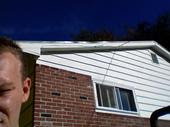
in John Livingston Lowes's The Road to Xanadu: a Study in the Ways of the Imagination, I learned that Samuel Taylor Coleridge rhymed his surname at various times with "whole ridge," "polar ridge," and "scholarage"! So how did he pronounce it?
glow of the smile-shaped paper activity

1 comment:
I have no evidence in front of me one way or the other, but I wouldn't be surprised at all if he would have pronounced "scholarage" with a long o, along the lines of "scholastic".
So then the only question is whether it's two syllable ("whole ridge") or three ("polar ridge", "scholarage"). (I suspect that he didn't pronounce "whole" with two syllables.)
It seems most likely from this evidence that the middle syllable was more or less a schwa, and that it could be elided in quick speech, allowing a "whole ridge" rhyme sometimes. Knowing the context of these three rhymes might make it clearer, of course.
Post a Comment